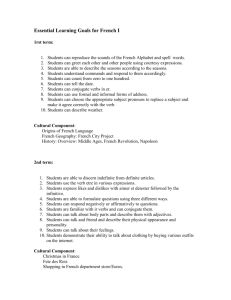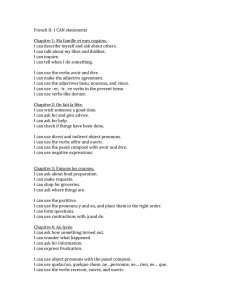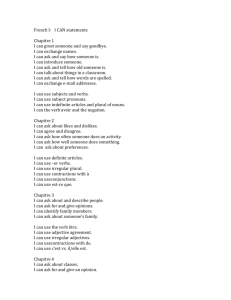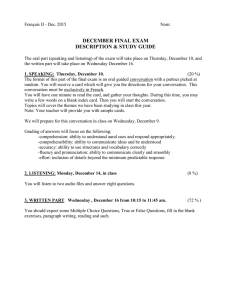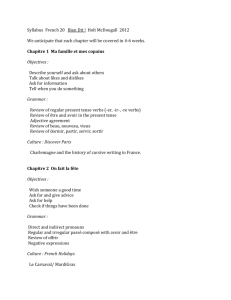Français II First Semester Final Exam Guide Date of exam: Friday
advertisement
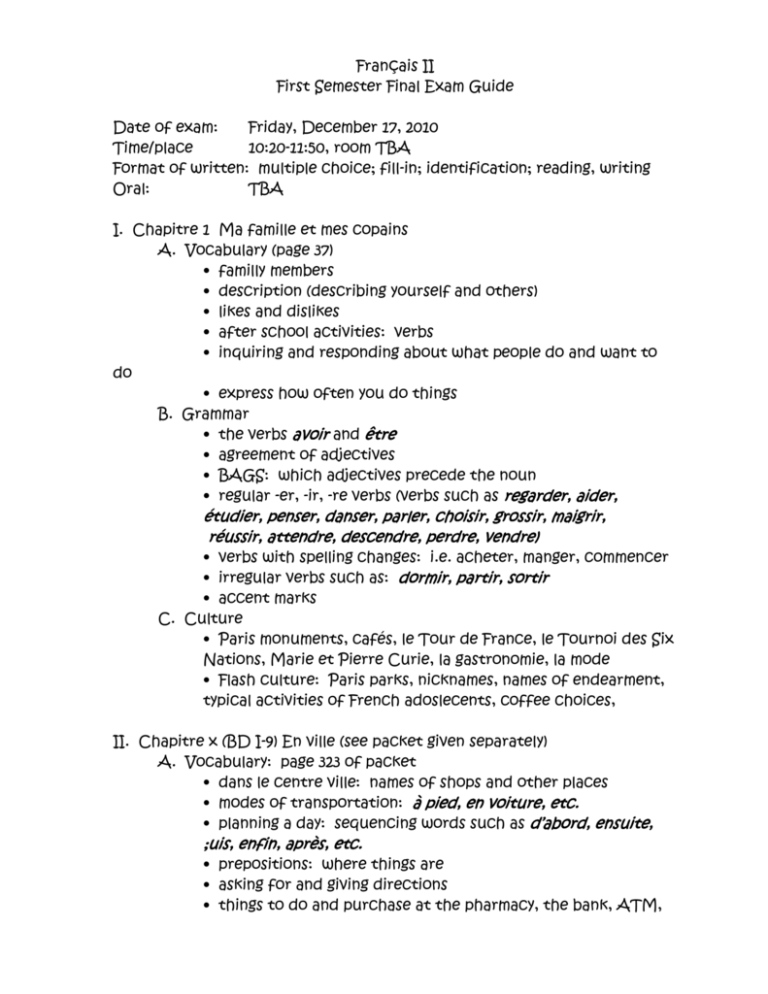
Français II First Semester Final Exam Guide Date of exam: Friday, December 17, 2010 Time/place 10:20-11:50, room TBA Format of written: multiple choice; fill-in; identification; reading, writing Oral: TBA I. Chapitre 1 Ma famille et mes copains A. Vocabulary (page 37) • familly members • description (describing yourself and others) • likes and dislikes • after school activities: verbs • inquiring and responding about what people do and want to do • express how often you do things B. Grammar • the verbs avoir and être • agreement of adjectives • BAGS: which adjectives precede the noun • regular -er, -ir, -re verbs (verbs such as regarder, aider, étudier, penser, danser, parler, choisir, grossir, maigrir, réussir, attendre, descendre, perdre, vendre) • verbs with spelling changes: i.e. acheter, manger, commencer • irregular verbs such as: dormir, partir, sortir • accent marks C. Culture • Paris monuments, cafés, le Tour de France, le Tournoi des Six Nations, Marie et Pierre Curie, la gastronomie, la mode • Flash culture: Paris parks, nicknames, names of endearment, typical activities of French adoslecents, coffee choices, II. Chapitre x (BD I-9) En ville (see packet given separately) A. Vocabulary: page 323 of packet • dans le centre ville: names of shops and other places • modes of transportation: à pied, en voiture, etc. • planning a day: sequencing words such as d’abord, ensuite, ;uis, enfin, après, etc. • prepositions: where things are • asking for and giving directions • things to do and purchase at the pharmacy, the bank, ATM, the post office • express how you feel • asking for information in different places around town • making and responding to requests B. Grammar • the verbs: connaître, savoir • more irregular verbs: aller, faire, mettre, nettoyer, ouvir, pouvoir, prendre, venir, voir • the imperative (command) forms: ex: parle, parlez, parlons • using est-ce que to ask questions • the inversion of questions • the partitive C. Culture • public transportation • the metric system of measurement • French drugstores, supermarkets and post offices • French streets, rond points, and traffic signals • using a credit card in France III. Chapitre 2 On fait la fête A. Vocabulary • French holidays and related terms • wishing someone a good time and holiday greetings • asking and giving advice on gift-giving • organizing a party: what things to do and purchase • asking for and responding to help in preparing things • checking to see if something has been done and responding B. Grammar • subject pronouns • direct object pronouns and where they belong in sentences • indirect object pronouns and where they belong in sentences • the verb: offrir • forming past participles to use in the passe compose • irregular past participles: bu, plu, vu, dit, fait, eu, été, mis pris, offert • the passé composé with avoir • the passé composé with être C. Culture • • • • French holidays Bastille Day la bûche de Noël holiday foods • holiday store hours OTHER: • spelling-changing verbs appeler, épeler, jeter, rappeler Oral Exam Week before finals start, presentation in front of class Speak for at least 1 1/2 minutes but no more than 2 minutes in French and include the following information: • introduce yourself and give your age • a physical description of yourself: hair and eye color; size • characterize yourself (what you are like) in a few words (include something you’re not) • what you like to do on weekends (first, next, then, finally) • describe your favorite places to shop and say where they are located • describe your favorite holiday and say why • how you like to celebrate your birthday • what gift you’re going to give someone for a special occasion • what you are going to do for winter break You may not read your presentation, but you may use a note card to remind yourself of what you need to say. You could also create a PowerPoint with a word or two on each slide and pictures to help guide your presentation. You will be graded on the following: Pronunciation Completeness Appropriate vocabulary Grammatical accuracy Preparedness/length 5 5 5 5 5 Suggestions for preparation and study: 1. Make new vocabulary lists in categories. Include whole sentences given in your vocabulary sections. 2. Color code masculine and feminine nouns and adjectives on flash cards. 3. Study the worksheets and workbook pages you did over the semester. 4. 5. 6. 7. 8. 9. Make a verb chart of commonly used verbs. Eat balanced meals. Get a lot of vitamin C known to help memory. Get enough rest. Don’t put off studying until the last minute or cram. Review several times over for 20 to 30 minutes at a time. Practice, practice, practice out loud.

